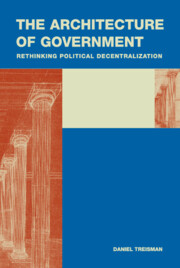Book contents
- Frontmatter
- Contents
- List of Figures and Tables
- Preface
- Glossary of Main Notation Used
- 1 INTRODUCTION
- 2 THE POLITICAL PROCESS
- 3 ADMINISTRATIVE EFFICIENCY
- 4 COMPETITION AMONG GOVERNMENTS
- 5 FISCAL POLICY AND REDISTRIBUTION
- 6 FISCAL COORDINATION AND INCENTIVES
- 7 CITIZENS AND GOVERNMENT
- 8 CHECKS, BALANCES, AND FREEDOM
- 9 ACQUIRING AND USING KNOWLEDGE
- 10 ETHNIC CONFLICT AND SECESSION
- 11 DATA TO THE RESCUE?
- 12 CONCLUSION: RETHINKING DECENTRALIZATION
- References
- Index
- Titles in the series
7 - CITIZENS AND GOVERNMENT
Published online by Cambridge University Press: 05 June 2012
- Frontmatter
- Contents
- List of Figures and Tables
- Preface
- Glossary of Main Notation Used
- 1 INTRODUCTION
- 2 THE POLITICAL PROCESS
- 3 ADMINISTRATIVE EFFICIENCY
- 4 COMPETITION AMONG GOVERNMENTS
- 5 FISCAL POLICY AND REDISTRIBUTION
- 6 FISCAL COORDINATION AND INCENTIVES
- 7 CITIZENS AND GOVERNMENT
- 8 CHECKS, BALANCES, AND FREEDOM
- 9 ACQUIRING AND USING KNOWLEDGE
- 10 ETHNIC CONFLICT AND SECESSION
- 11 DATA TO THE RESCUE?
- 12 CONCLUSION: RETHINKING DECENTRALIZATION
- References
- Index
- Titles in the series
Summary
In a town-meeting, the great secret of political science was uncovered, and the problem solved, how to give every individual his fair weight in the government, without any disorder from numbers. … In this open democracy, every opinion had utterance; every objection, every fact, every acre of land, every bushel of rye, its entire weight. … A general contentment is the result. And the people truly feel that they are lords of the soil.
Ralph Waldo Emerson (1903 [1835])I wish only to stress a significant, and frequently misconceived, point: decentralization is one thing, democracy is another. The government of Sweden is far more decentralized than the government of New York City, but it is not thereby more democratic.
Irving Kristol (1968, p. 22)This chapter examines two claims about the way decentralization influences the relationship between citizens and their governments. Since the days of the Greek polis, involvement in public affairs has been thought to develop citizens' political capacities and to cultivate civic spirit. Decentralization has been seen as a way to increase the opportunities for citizens to participate even within large states. A second set of arguments focuses on cases in which, rather than take part in government themselves, citizens control their representatives indirectly by means of the ballot box. Decentralized institutions are said to render officials more accountable to the voters.
Civic virtue
An ancient argument contends that human beings realize their true nature, or acquire important values and skills, by helping to govern their communities.
- Type
- Chapter
- Information
- The Architecture of GovernmentRethinking Political Decentralization, pp. 156 - 192Publisher: Cambridge University PressPrint publication year: 2007

